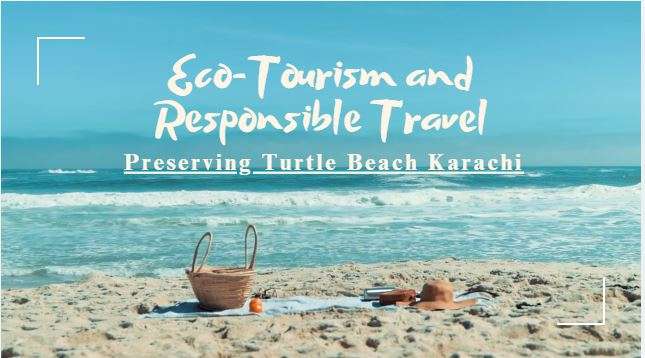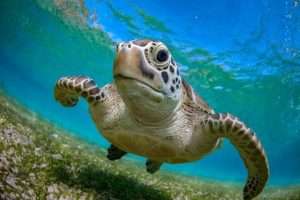
Turtle Beach, located between Hawkesbay and Sandspit in Karachi, serves as a vital nesting ground for endangered species like the Green and Olive Ridley turtles. The serene environment and the unique wildlife it supports have made this beach a focal point for eco-tourism and conservation efforts. With growing environmental awareness, there’s a strong emphasis on preserving Turtle Beach’s fragile ecosystem for future generations.
The Value of Eco-Tourism and Responsible Tourism
Eco-tourism refers to responsible travel to natural areas that conserves the environment, supports local communities, and promotes education about cultural heritage. This approach is more than just a trend — it’s a necessary shift in how we interact with nature. For a sensitive area like Turtle Beach, eco-tourism serves as a valuable tool to protect endangered species and ensure that tourism activities don’t damage their habitats.
Why Responsible Tourism Matters?
Responsible tourism is a concept closely linked with eco-tourism, but it places extra emphasis on the impact of travelers. Visitors to Turtle Beach can enjoy outdoor activities in Karachi, such as water sports, without leaving a harmful footprint on the environment. The focus of responsible tourism is on sustainability — helping nature and local communities thrive while also providing tourists with unique, meaningful experiences.
The Importance of Protecting Turtle Beach
Turtle Beach is one of Karachi’s hidden coastal gems, renowned for being a significant nesting ground for turtles. While the Green turtle is protected by law in Pakistan, the beaches they call home are not formally designated as protected areas. This lack of formal protection complicates conservation efforts, leaving the delicate ecosystem vulnerable to disruption.
A Critical Nesting Ground for Endangered Turtles
The beach provides nesting grounds for both the Green and Olive Ridley turtles, species that are classified as endangered. The preservation of these habitats is vital not only for the turtles themselves but also for maintaining biodiversity in the region. Without proper care, human interference — whether intentional or accidental — can destroy the nesting sites, affecting the survival of future generations of turtles.
Conservation Efforts at Turtle Beach

- Community Involvement in Eco-Tourism
At PALS Outdoors, we believe that the local community plays a pivotal role in conservation. Engaging residents in eco-tourism ventures allows them to benefit economically while actively participating in the protection of their natural surroundings. This collaboration fosters a deep sense of responsibility toward Turtle Beach and ensures that conservation efforts are not just driven by external entities but by the people who call this region home.
- Promoting Eco-Friendly Practices
An essential aspect of eco-tourism at Turtle Beach is promoting sustainable and eco-friendly practices. Tourists are encouraged to engage in responsible tourism by respecting local wildlife and ensuring their activities, such as outdoor corporate team building, are conducted in an environmentally conscious way. Eco-friendly accommodations are recommended to minimize waste, and visitors are encouraged to follow leave-no-trace principles to protect the nesting grounds.
- Proposed Protected Area Status for Turtle Beach
Although Turtle Beach is well-known for its ecological significance, it still lacks the formal protected area status it deserves. Conservationists and local activists have proposed designating the beach as a protected area to safeguard its fragile ecosystem. Formal protection would limit human activities that could potentially damage the turtle nesting sites and disrupt the marine creatures that call this area home.
Challenges and Opportunities in Conservation
- The Threat of Human Encroachment
One of the main challenges facing Turtle Beach is the increasing human activity in the region. While tourism has economic benefits, unregulated human encroachment can result in habitat degradation. Visitors who are unaware of the ecological sensitivity of Turtle Beach may inadvertently cause damage, particularly to the turtles’ nesting sites. Waste management, proper signage, and tourist education are essential to mitigating these impacts.
- Building Awareness Through Responsible Travel
Raising awareness about responsible tourism is crucial. At PALS Outdoors, we advocate for educating visitors on how their actions can affect the local environment. Simple measures like avoiding littering, staying on designated paths, and keeping a safe distance from wildlife can go a long way in preserving the beach’s natural state. Through responsible tourism, we aim to ensure that future generations will continue to enjoy the beauty and tranquility of Turtle Beach.
Sustainable Practices for a Greener Future
- Eco-Tourism as a Tool for Conservation
Eco-tourism at Turtle Beach is not just about offering a unique travel experience; it is a powerful tool for conservation. By promoting activities like water sports in Karachi and outdoor adventures in a way that aligns with environmental sustainability, eco-tourism contributes to the long-term protection of the region’s delicate ecosystems. Sustainable tourism practices ensure that Turtle Beach’s environmental impact remains minimal, allowing marine life, especially endangered turtles, to thrive.
- Supporting Local Communities
Responsible travel isn’t just about conserving the environment — it’s also about supporting the people who live in the region. By involving local communities in eco-tourism ventures, such as guided nature tours or beachfront accommodations, we create opportunities for economic development. This, in turn, fosters greater interest in conservation, as locals take pride in preserving the environment that sustains them.
The Role of Policy and Governance
- The Need for Stronger Conservation Policies
To preserve Turtle Beach’s delicate ecosystem, it is vital that local and national governments implement stronger conservation policies. The collaboration between government bodies, NGOs, and local communities is critical to ensure effective protection. Conservation policies must not only regulate tourism but also actively protect turtle nesting areas and other marine life that make Turtle Beach so special.
- Collaborative Conservation Efforts
At PALS Outdoors, we believe that successful conservation requires a collaborative effort. By working with government agencies, local communities, and environmental organizations, we aim to promote sustainable tourism practices and ensure that Turtle Beach remains a safe haven for wildlife. This multi-faceted approach combines eco-tourism, education, and policy advocacy to protect the beach for future generations.
A Sustainable Future for Turtle Beach
A sustainable future for Turtle Beach depends on eco-tourism and responsible travel, which offer opportunities for both environmental conservation and community development. At PALS Outdoors, we are dedicated to preserving this important sanctuary for endangered turtles by promoting responsible travel practices and advocating for its protected status. Engaging local communities in conservation efforts ensures that the beach remains an ecologically rich and culturally significant site.
Turtle Beach is more than just a destination; it is a critical ecological asset that requires safeguarding. By embracing responsible tourism, we can ensure that this coastal gem remains a thriving habitat for marine life while offering a serene escape for visitors. For more insights, check out our comprehensive guide, “Turtle Beach Karachi: A Hidden Coastal Gem,” to dive deeper into the history, beauty, and ecological importance of this coastal treasure.
Book a trip by Call/WhatsApp us at +92 345 555 5689 or submit the contact form.

